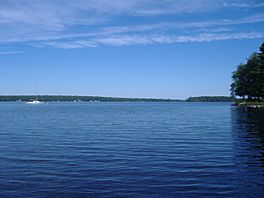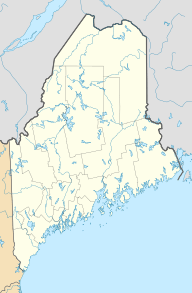Pushaw Lake facts for kids
Quick facts for kids Pushaw Lake |
|
|---|---|
 |
|
| Location | Penobscot County, Maine, United States |
| Coordinates | 44°55′59″N 68°48′04″W / 44.933027°N 68.801013°W |
| Lake type | Reservoir |
| Primary inflows | Pushaw Stream and others |
| Primary outflows | Pushaw Stream to Penobscot River |
| Basin countries | United States |
| Max. length | 7.6 mi (12.2 km) |
| Max. width | 2.3 mi (3.7 km) |
| Surface area | 4,680 acres (1,890 ha) |
| Average depth | 11 ft (3.4 m) |
| Max. depth | 33 ft (10 m) |
| Water volume | 53,102 acre-foot (65,500,000 m3) |
| Surface elevation | 115 ft (35 m) |
| Islands | 14+ |
Pushaw Lake is a beautiful lake located in Penobscot County, Maine, in the United States. It's about 6.5 miles (10.5 km) north of downtown Bangor and 4.5 miles (7.2 km) west of downtown Orono. This lake is known as a "warmwater lake" because its waters are warm enough for many types of fish and plants to live there.
The lake stretches across parts of four towns: Orono, Old Town, Hudson, and Glenburn. You can find roads and houses along most of the lake's edge. However, the southeastern side is different, as it borders the Caribou Bog complex, which is a large wetland area.
Discovering Pushaw Lake
Pushaw Lake is an important natural feature in Maine. It's a popular spot for people who enjoy being outdoors. The lake is quite large, covering about 4,680 acres (1,894 hectares).
How Was Pushaw Lake Formed?
The exact history of Pushaw Lake before 1920 is not fully clear. Scientists believe that the lake was likely formed by melting glaciers a very long time ago. Glaciers are huge sheets of ice that move slowly, carving out land and leaving behind depressions that can fill with water.
Some local people have another idea. They think the lake might have become much larger due to big floods or even human activities at some point in history. This idea helps explain why the lake is quite shallow in many places.
Controlling Water Levels
In 1920, a small dam was built at the place where water flows out of Pushaw Lake. This dam helps to keep the water level in the lake steady. Dams are structures built across a river or stream to hold back water, creating a reservoir or controlling water flow.



